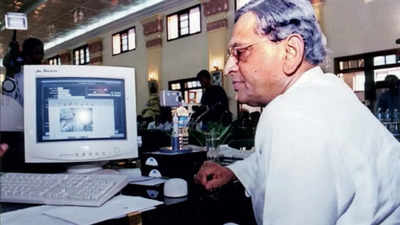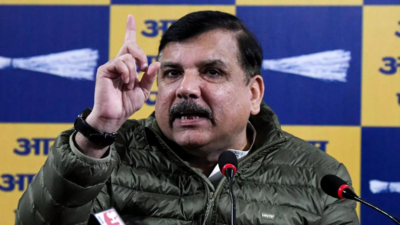
Coding new destiny: Bengaluru’s blueprint will forever have SMK imprint BENGALURU: In the annals of city’s transformation from a pensioners’ paradise to ‘Silicon Valley’, few political figures loom as large as SM Krishna , the former Karnataka chief minister. During his tenure from 1999 to 2004, Krishna laid the groundwork for what would become India’s most robust technology ecosystem, transforming Bengaluru from a sleepy govt town to the country’s premier tech hub. While Bengaluru, with its middle class coming off age in the late 1980s — companies like Infosys had been formed — and economic growth finding new avenues post-liberalisation, had chief ministers like Veerappa Moily, HD Deve Gowda and JH Patel giving the city a forward push, notable change began with Krishna’s tenure, when Karnataka and especially its capital, gained leverage.
When Krishna took office, the global technology landscape was on the cusp of a massive shift. The Y2K phenomenon was creating unprecedented demand for tech talent, and Krishna recognised this as a golden opportunity. Unlike many of his contemporaries who viewed technology with skepticism, he embraced it with foresight and enthusiasm.

Krishna’s approach was deeply strategic. He personally cultivated relationships with global tech leaders and politicians, building direct connections. While his connections with people like Bill Gates (Microsoft) or John Chambers (Cisco) among others is well documented, Krishna was also able to attract politicians.
For instance, the mid-2000 visit to Bengaluru by Japanese Prime Minister of the time, Yoshiro Mori, proved instrumental in pushing Bengaluru’s ambitions. It paved the way for FDI from Japan into India’s tech sector. In fact, Krishna’s tenure coincided with Bengaluru becoming a prime destination for visits by top honchos and politicians.
Then British Prime Minister Tony Blair, GE’s Jack Welch and Intel’s Craig Barrett are some examples. Bengaluru became a hub for the back-office operations of several of these MNCs which set up BPOs, opening the doors for offshore operations. The city has since grown to even house GCCs of tens of MNCs today.
Aarin Capital Partners chairman & former Infosys CFO, Mohandas Pai, said: “...
A true globalist, he worked hard to make Bengaluru a truly global city and Karnataka India’s best state. He was a star and a statesman..
.” But it’s not that Krishna had it all very easy. Not very far away from Bengaluru — 570km may seem far, but view this in the context of the entire world being a connected village — was Hyderabad of the undivided Andhra Pradesh.
Its CM, Chandrababu Naidu was equally determined to make his capital the tech hub of India. His efforts as CM and personal tech-savviness later earned him the moniker Cyber Babu. The competition was fierce.
Hyderabad, under Naidu, was aggressive in courting tech companies. “..
.Our friendship transcended the competitive spirit we shared in attracting investments to our respective states. He was a true leader who always prioritised the welfare of his people,” Naidu said Tuesday, while expressing his condolences to Krishna’s family and friends.
While many experts concur that without Krishna, Karnataka’s technological trajectory would have, perhaps, been dramatically different, what set him apart was his holistic approach. He understood that attracting technology companies wasn’t just about offering incentives, but about creating an ecosystem that could support and nurture innovation. He set up the IT Task Force with Infosys founder NR Narayana Murthy at its helm.
That you needed an ecosystem to sustain investments and companies you initially lure led Krishna to also establish the Bangalore Agenda Task Force (BATF), a public-private partnership — a pioneering concept for the time — that brought together business leaders, civic administrators, and entrepreneurs. The results were transformative. Companies like Wipro and Infosys found in Krishna an ally who understood their potential.
By the early 2000s, Bengaluru was already being dubbed the ‘ Silicon Valley of India ’ – a moniker that has turned into an epithet. Biocon chairperson Kiran Mazumdar Shaw, says: “He was a visionary CM who brought transformational policies that shaped Bengaluru and Karnataka into a global technology hub. He created Vision Groups as a unique model of partnership between business and bureaucracy to deliver IT, BT & Startup policies that continue to be emulated by successive govts.
I consider him one of the great CMs of our country who leaves an unforgettable legacy of progressive reforms.” After the initial setback with the consortium of Tata Group, Raytheon and Singapore Changi Airport pulling out of the Bangalore International Airport project due to delays in approvals, the govt JH Patel govt had managed to formalise, in May 1999, an MoU between the AAI and KSIIDC. And it was during Krishna’s tenure that proper groundwork was laid for the new airport, which is operational today.
Similarly a formative push for the Metro project, which was conceived as early as in the 1980s, came during his term with his govt commissioning DMRC to conduct a detailed study which led to the final DPR for phase-1 after Krishna’s term, in 2006. Stay updated with the latest news on Times of India . Don't miss daily games like Crossword , Sudoku , and Mini Crossword .
.















